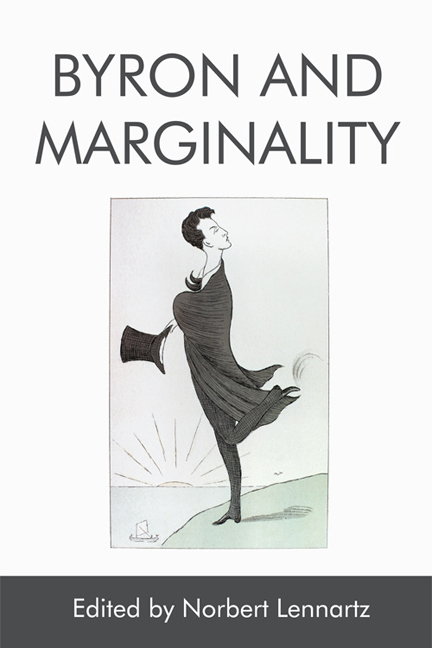Book contents
- Frontmatter
- Contents
- Foreword
- Acknowledgements
- Editions and Abbreviations
- 1 Lord Byron, Wandering and Wavering between the Centres and Margins of Romanticism: An Attempt at an Introduction
- I Byron’s Marginalisation in Romantic World Literature
- II Byron’s Marginal Identities and Places
- III Cherishing the Marginal – Marginal Genres in Byron
- IV On the Provocative Margins of Taste
- V Marginal Affairs – Visual and Paratextual Aspects in Byron
- List of Contributors
- Index
Foreword
Published online by Cambridge University Press: 06 May 2021
- Frontmatter
- Contents
- Foreword
- Acknowledgements
- Editions and Abbreviations
- 1 Lord Byron, Wandering and Wavering between the Centres and Margins of Romanticism: An Attempt at an Introduction
- I Byron’s Marginalisation in Romantic World Literature
- II Byron’s Marginal Identities and Places
- III Cherishing the Marginal – Marginal Genres in Byron
- IV On the Provocative Margins of Taste
- V Marginal Affairs – Visual and Paratextual Aspects in Byron
- List of Contributors
- Index
Summary
When Professor Norbert Lennartz invited me to open the conference at the University of Vechta, on the subject of Lord Byron and the Margins of Romanticism, I was initially puzzled. How could Byron, more widely read in England than any of the other Romantic poets, and read both in English and in translation across Europe, be at the margins of Romanticism? Yet, as the conference progressed, I began to see the scope for such an approach and started to realise how Byron does not fit so neatly into the traditional Romantic canon.
The papers from that conference have now been brought together in this book, which encourages us to approach Byron in a different and sometimes provocative way. By asking readers to look afresh at aspects of Byron that are familiar – his admiration for Classical poets such as Pope and Dryden, his hostility towards many of his contemporary Romantic poets, the heavy irony and stark realism that characterise so much of his work – we are invited to consider to what extent Byron can be categorised as a ‘true’ Romantic.
Within the broad scope of this volume, distinguished scholars seek to examine a number of important texts sometimes marginalised in Byron studies, to explore how Byron's own self-created identity as an outsider redefines a form of Romanticism centred on rebelliousness and to reflect on the geographic marginalisation of Byron's own life outside England and his interest in the Orient.
Although I write as someone who is far from being an English literature scholar, I am sure that this volume will make an important contribution to the debate as to whether Byron was indeed marginal to Romanticism, or whether through his rebellious iconoclasm, his humour and irony, and the persona of the marginalised outsider, Byron created a new variant of Romanticism where he takes centre stage.
- Type
- Chapter
- Information
- Byron and Marginality , pp. viiPublisher: Edinburgh University PressPrint publication year: 2018



